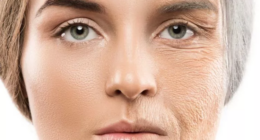Let’s find out “How to fix damaged skin barrier?” If your skin is dry, itchy, or inflamed, it may be because it’s not getting the hydration and oxygen it needs. Poor skin barrier function can lead to eczema, psoriasis, seborrhea, and other skin conditions. In this article, we’ll show you how to fix damaged skin barrier with a few simple steps.

The problem with damaged skin barrier
There is a big problem with damaged skin barrier: it can cause major problems such as dryness, irritation, and even dermatitis. In fact, a decreased skin barrier function is one of the top three causes of dry skin. Luckily, there are ways to fix damaged skin barrier. Here are four tips to get started:
1. Try an antioxidant cream. Antioxidants are essential for repairing the skin’s damaged barrier function. They help to neutralize free radicals and protect the cells from damage. Some good antioxidant creams include retinoids, vitamin C, and green tea extract. Apply them every day before bedtime for best results.
2. Use a moisturizer that contains hyaluronic acid. Hyaluronic acid is a natural molecule that helps keep skin hydrated and healthy by binding water molecules. It’s found in many moisturizers and serums, both prescription and over-the-counter, so try several until you find one that works well for you. Apply it at least twice daily before bedtime for best results.
3. Eat foods high in antioxidants. Antioxidants are important for fighting damage to the skin barrier function, so make sure to eat foods high in antioxidants every day. These include fruits and vegetables, whole grains, nuts, and fatty fish.
4. Take a supplement containing antioxidants. There are many antioxidant supplements on the market, so try several until you find one that works well for you. Some good options include vitamin C, β-carotene, and selenium.
Types of damage to the skin barrier
The skin barrier is an important layer of defense against the environment and toxins. It helps protect the body from bacteria, pollution, and other irritants. There are many different types of damage to the skin barrier, which can lead to skin problems. Here are three common types of damage:
1. Epidermal disruption: This type of damage occurs when the protective layer of skin cells is damaged or destroyed. This can happen as a result of injuries, burns, or even chronic skin conditions like psoriasis. The skin becomes dry and cracked, and it’s difficult for the body to fight off infections.
2. Dermal infiltration: This type of damage occurs when foreign objects or disease spread through the skin barrier and into the underlying tissues. This can cause inflammation and pain, as well as cosmetic problems like scars. It’s also a major cause of skin cancer.
3. Deficiency in barrier function: When the protective layer of skin cells isn’t strong enough, dirt, oil, and other contaminants can easily enter the skin. This can lead to acne, dryness, and other skin problems.
How to fix damaged skin barrier
If you have damaged skin barrier, there are a few things you can do to help improve the situation. First, make sure to drink plenty of water and avoid dehydration. Second, make sure to use a sunscreen that is Broad-Spectrum SPF 30 or higher when outdoors. Finally, use a moisturizer that has an SPF rating of at least 15.
Benefits of fixing damaged skin barrier
If you’re like most people, you probably don’t think much about your skin barrier. But this thin layer of protective skin is essential for keeping our bodies healthy. When the skin barrier is damaged, it can lead to a number of problems, including dryness, irritation, and even acne. Here are four ways to improve your skin barrier:
1. Protect your skin against environmental damage. Pollution, sun exposure, and other harsh chemicals can damage your skin barrier and cause irritation and dryness. Keep your skin moisturized and free from pollutants by using sunscreen and avoiding harmful products.
2. Eat a balanced diet. Healthy foods help to maintain the health of the skin barrier as well as the overall health of your body. Include plenty of fruits, vegetables, and whole grains in your diet to help protect against inflammation and dermatitis. Avoid sugary drinks, processed foods, and unhealthy fats.
3. Take supplements for optimal health. Some supplements (like antioxidants) can help to improve the health of the skin barrier by fighting free radicals. Other supplements (like omega-3 fatty acids) can promote healthy cell function and reduce inflammation. Ask your doctor which supplements might be best for you.
4. Use topical treatments. topical treatments, like creams and lotions, can help to improve the health of the skin barrier by protecting it against damage and providing moisture. Choose products that are free from sulfates, parabens, and phthalates, which are common ingredients in many skin care products.
Conclusion
If you’re noticing your skin becoming dry and irritated, it may be time to take a look at your skin barrier. This delicate layer of skin acts as a buffer between your internal environment and the external world, protecting you from harsh chemicals, environmental pollutants, and other irritants. However, if this barrier is compromised, your skin can become sensitive to different kinds of stimuli (both external and internal), which can lead to a host of problems like breakouts or excessive dryness. To help restore balance and protect your skin from future damage, here are four tips for repairing damaged skin barrier:
1) Use a good moisturizer every day. Moisturizers work to replenish lost moisture and promote healing by stimulating the production of protective oils. They also help improve the appearance of dry patches by sealing in moisture while providing an antioxidant boost.
2)Avoid using harsh scrubs or cleansing products on your face. These types of products can strip away both natural oil production and the protective lipid layer that lies below the surface of the skin.
3)Take breaks from intense sun exposure. Sun exposure has been known to cause photoaging (age spots), reduce collagen production, and worsen already-damaged skin Barrier function due to its erythema (redness).
4)Supplement with antioxidants to help improve the skin barrier’s natural defense mechanisms. Some good options include vitamins C and E, carotenoids (like β-carotene and lycopene), and selenium.









